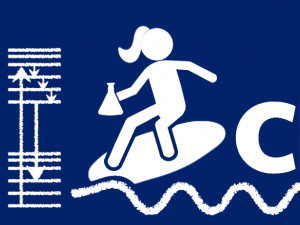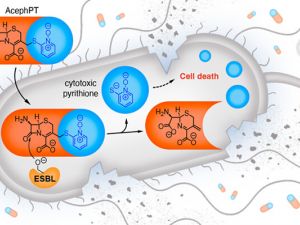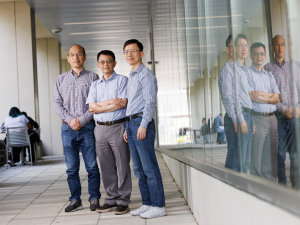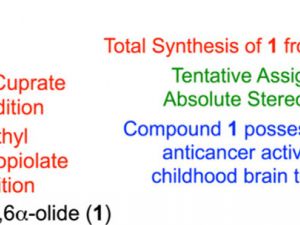Iridium oxide is one of the most important — and most problematic — materials in the global push toward clean energy. It is currently the most reliable catalyst used in the conversion of energy to chemicals by electrolysis, a process that uses electricity to split water molecules into oxygen and hydrogen.But iridium is among the rarest non-radioactive elements in Earth’s crust, and not unlike metal rusting over time, iridium oxide catalysts slowly degrade under the harsh acidic and high-voltage conditions required for… read more about Watching a Critical Green-Energy Catalyst Dissolve, Atom by Atom »
Are you interested in independent Chemistry research? Would you love to expand your hands-on research in the lab this summer? Apply now to Chem-SURF! The Chemistry Undergraduate Summer Research Fellows (Chem-SURF) Program is a summer program designed to support students who are conducting research. All undergraduate researchers who are on campus during the summer are welcome to participate in program activities, including weekly professional development workshops, community-building events, and an undergraduate… read more about Duke Chem Researchers: Join for the Summer! »
An interdisciplinary team of Duke faculty is among the international recipients of a new grant from the Schmidt Sciences Humanities and Artificial Intelligence Virtual Institute (HAVI), a program designed to bridge the gap between AI technology and humanistic inquiry. Led by Martin Fischer, Research Professor of Chemistry and Physics; Shira Faigenbaum-Golovin, Assistant Professor of Mathematics from Bar-Ilan University (formerly of Duke); and John K. Delaney, from the National Gallery of Art in Washington, the project… read more about Duke Researchers Awarded Grant to Reveal Hidden Histories of Artworks Through AI and Imaging »
Duke’s Trinity College of Arts & Sciences has invited its faculty to submit proposals for the creation of new research initiatives on campus.Following the successful launches of the SPACE Initiative and the Society-Centered AI Initiative, the Trinity Research Initiative will support new directions for interdisciplinary research through seed funding for nascent research collaborations, community-building, and complementary educational and outreach activities.Open to all areas of research and… read more about Trinity College of Arts & Sciences Invites Proposals for New Research Initiatives »
Positive mentors are the reason I am pursuing graduate school today. As an undergraduate at Virginia Tech, I was eager to get involved in research but unsure where to begin. I hesitantly reached out to one of my professors about joining his lab, and to my surprise, he enthusiastically welcomed me as a mentee. Since that first experience, every interaction I’ve had with science professionals has reflected that same intentionality and excitement. It has been refreshing and motivating to encounter such genuine… read more about Three Qualities of Exceptional Mentors »
Many enzymes use radical chemistry to build essential molecules, but radicals are highly reactive and can easily cause damage if not tightly controlled. The study by the labs of Profs. Ken Yokoyama, Pei Zhou, and Weitao Yang of the Chemistry Department reveals how a radical-generating enzyme, MoaA, from the radical S-adenosyl-L-methionine (SAM) superfamily, senses when its correct substrate is bound and safely triggers the radical reaction. Using a combination of nuclear magnetic resonance (NMR) and electron… read more about Chem & Biochem Collab: How a tiny enzyme helps build a big brain »
Congratulations to Avery Vigil! Avery has been selected as one of the 2026 Energy Technology Division Graduate Student Awardees! Formal recognition of this honor will take place during the 249th Electrochemical Society Meeting in Seattle, WA in May 2026. Avery will be presented with a certificate, a check for $1,000, and a ticket to the Division Business Meeting. As the Energy Technology Division Graduate Student Award sponsored by BioLogic winner, Avery will deliver an oral presentation of 40 minutes at the ECS… read more about Avery Vigil Receives 2026 Energy Technology Division Award »
Congratulations to Professor Julie Pollock! Julie, a Duke Chemistry graduate, has received a Henry Dreyfus Teacher-Scholar Award! The award honors young faculty in the chemical sciences who have created an outstanding independent body of scholarship and are deeply committed to education with undergraduates. Julie completed her PhD with Prof. Dewey McCafferty in 2011 and departed for an NIH Postdoctoral Fellowship with Prof. John Katzenellenbogen at the University of Illinois Urbana-Champaign. She began her… read more about Congrats to Alumna Julie Pollock! »
Professor Kenichi Yokoyama and team have showed that a newly discovered enzyme is sufficient to make azetidine, an organic compound and a building block of a wide range of therapeutics, including antibiotics, antiviral drugs, and cancer treatments. Rather than relying on harsh solvents and toxic chemicals, the team discovered enzymes, PolF and PolE, that produce azetidine from an inexpensive precursor compound in water. “The two enzymes that we discovered are functionally and structurally… read more about Changing Drug Manufacturing One Enzyme at a Time »
Electrocatalysts can produce valuable chemicals with electricity, but current electrocatalysts suffer from slow reaction kinetics. The chemical composition of electrocatalysts is known to have a big impact on catalyst activity, but exactly why certain compositions lead to a better catalyst is not known. In this work, the Moreno-Hernandez laboratory developed electrochemical methods to determine thermodynamic and kinetic information about reaction intermediates involved in electrocatalysis. These methods were applied… read more about Understanding the Reaction Energetics of Oxygen-evolving Electrocatalysts »
Edwin Alfonzo, assistant professor of Chemistry, really wanted to make molecules. He discovered this passion in an organic chemistry class at the University of Massachusetts-Lowell. “I was a sophomore, and I remember sitting in that classroom, putting together chemical routes to target the molecules the professor assigned to us, and thinking with amazement, ‘Wow, we humans really have an incredible level of control.’” Deeply moved by the realization that chemistry allows us to control matter to such a high level… read more about Edwin Alfonzo Uses Biology to Tackle Chemistry’s Hard Problems »
Evert Njomen doesn’t want to waste time. The new assistant professor of Chemistry and HHMI Hanna Gray Faculty Fellow identifies potential drug targets by employing a time-saving method and proteome-wide approach pioneered by her postdoc supervisor, Benjamin Cravatt at the Scripps Research Institute. The approach the Njomen Lab uses allows drugs to be discovered in native systems, like cell cultures or animal models, as opposed to the traditional method of purifying a single protein target and screening millions of… read more about Evert Njomen Wants to Speed Up Drug Discovery »
In a recently published study available in the Journal of the American Chemical Society, the Yokoyama lab characterized the mechanism of oxidative C-C bond cleavage reaction catalyzed by Fe and 2-oxoglutarate (2-OG)-dependent oxidase, PolD. This enzyme diverges the biosynthetic pathways between C6 and C7-sugar nucleoside antifungals, and therefore, its mechanistic and structural understanding is important for the future genome-mining discovery of novel antifungals. Most significantly, they found that the… read more about Yokoyama Lab Found the Novel Reactivity of an Fe-dependent Oxidase in Antifungal Biosynthesis »
Prof. Dorian Canelas was featured on classcentral.com for teaching one of the best chemistry courses available online! Her Coursera course, Introduction to Chemistry: Reactions and Ratios prepares students for further study in chemistry as needed for many science, health, and policy professions by emphasizing chemical problem solving. When not providing online lectures, Dori can be found in-person this Fall leading Organic Chemistry on Duke's west campus! read more about Canelas' Intro to Chem Featured on ClassCentral! »
The Malcolmson Lab has developed an enantio- and diastereoselective copper-catalyzed method for assembling chiral 1,4-diamines, nitrogen-containing molecules with broad applications in pharmaceuticals and ligand design for which there are few direct synthetic approaches. A research team led by former postdoc, Pengfei Zhou (now an assistant professor at Chongqing Medical University) and graduate student, Jiaqi Zhu, discovered the novel carbon–carbon bond-forming strategy that proceeds through reductive… read more about New Catalytic Enantioselective Approach to 1,4-Diamines »
Developing clean energy technologies that are affordable and sustainable are key to reducing our dependence of fossil fuels and the resulting negative climate impacts.Four faculty in the Department of Chemistry — David Beratan, Jie Liu, Ivan Moreno-Hernandez and Michael Therien — are exploring promising new directions in renewable energy research. From finding cost-effective ways to transport hydrogen to investigating biological models of energy conversion, these professors are moving us closer to… read more about New Directions in Renewable Energy »
The tree outside the window has a lot to teach us about clean energy production.“Plants have perfected the synthesis of oxygen through photosynthesis,” explained Ivan Moreno-Hernandez, assistant professor of Chemistry.In photosynthesis, plants use the energy of the sun to split water molecules into oxygen and hydrogen. The hydrogen atoms are used to create the chemical energy the plants need to grow, while oxygen is a clean, and welcome, by-product.While plants are great at these electrochemical reactions — harnessing… read more about Tiny Materials Could Lead To Big Energy Savings »
“My lab is in the business of knowledge creation,” said David Beratan, R.J. Reynolds Distinguished Professor of Chemistry. “Our tools are pencil, paper and computers.” Beratan’s theoretical chemistry research group works closely with collaborators like Duke colleagues Michael Therien and Weitao Yang to realize ideas that come out of their research. “We're trying to understand how highly efficient biological energy systems work, so that our experimental collaborators can translate that knowledge into man-made structures… read more about From Nature’s Pathways to Future Clean Energy Technologies »
It’s expensive to transport a gas, especially hydrogen.Solids and liquids can be moved from one place to another efficiently using infrastructure like trucks, trains and ships, but gases are a different story. In order to transport a gas like hydrogen — an important component of both fertilizer and fuels — in a safe and cost-effective way, it needs to be converted to a liquid state. It’s even better if you don’t have to transport it at all, instead synthesizing it cheaply and easily where it’s needed.This is the focus of… read more about Harnessing Solar Energy to Deliver Hydrogen Where It’s Most Needed »
“It's always exciting to be a scientist,” said Michael Therien, William R. Kenan, Jr. Distinguished Professor of Chemistry. “The pace of discovery over my career has been remarkable. It's been fun to watch, and equally enjoyable to have made small contributions from my laboratory.”But Therien’s and his research group’s contributions to Duke and the scientific community have been anything but small. For more than three decades, his lab’s investigations in solar photochemistry — the study of the chemical effects of light —… read more about Turning Light Into Energy, With Plant Leaves as a Guide »
A new strategy for strengthening polymer materials could lead to more durable plastics and cut down on plastic waste, according to researchers at MIT and Duke University.Using machine learning, the researchers identified crosslinker molecules that can be added to polymer materials, allowing them to withstand more force before tearing. These crosslinkers belong to a class of molecules known as mechanophores, which change their shape or other properties in response to mechanical force. read more about AI Helps Duke and MIT Chemists Develop Tougher Plastics »
We love a collaboration!! The Widenhoefer and Craig Labs have teamed up to describe what they term multi-state mechanocatalysis (MMC), which they believe is the first demonstration that externally applied mechanical forces can be directed through a polymer network into single-site catalysts, using those forces to bias the outcome of a catalytic reaction. In a sense, MMC can be thought of as top-down atomic manipulation—pushing and pulling molecules into the optimal shape for a desired function (here, catalysis). The MMC is… read more about Widenhoefer and Craig Labs Team Up to Make Advances in Further Understanding of Mechanically Coupled Ligand Effects in Catalysis »
Congratulations to Professor David Beratan! He is an Elected Member of the International Academy of Quantum Molecular Science! The IAQMS was established in 1967 in Menton, France and counts 13 Nobel Laureates among current and past members. The Academy advocates quantum-molecular science around the world and organizes the International Congress of Quantum Chemistry triennially. Congratulations, David! read more about Beratan Elected to International Academy of Quantum Molecular Science »
The Moreno-Hernandez Lab's recent work in preserving rare elements through nanoscience has made the cover of the Journal of the American Chemical Society! Noble metal oxides are materials that are incredibly rare on earth but also have incredible properties that make them useful for chemical transformations and renewable energy. In this work, the Moreno-Hernandez Lab discovered a way to grow these expensive materials on inexpensive supports that not only made better use of the material but also had synergistic… read more about Moreno-Hernandez Lab Makes JACS Cover! »
Bacteria resistant to β-lactams, our largest class of antibiotics, pose a serious health threat. Our current catalog of antibiotics and their overuse has helped to select for bacteria possessing resistance enzymes, β-lactamases, capable of degrading all β-lactams antibiotics, greatly weakening our current arsenal and thwarting further antibiotic development efforts. Expression of these β-lactamases is typically a strength of resistant, pathogenic bacteria; the Franz lab designed a molecule to turn β-lactamase… read more about Franz Lab Targets Local Delivery (of active drugs, that is!) »
Professor Jiyong Hong has teamed up with researchers from Molecular Biology and Anesthesiology to develop a promising new approach to pain management using adenosine, a naturally occurring compound in the human body that can help regulate pain, inflammation and seizure activity. Together with Prof. Seok-Yong Lee and Prof. Ru-Rong Ji, Professor Jiyong Hong is work toward the development of a non-opioid pain-relieving compound that inhibits equilibrative nucleotide transporter subtype 1 (ENT1), which is the main… read more about Hong Lab Making Pain a Thing of the Past »
A multidisciplinary team across Duke University is developing a promising new approach to pain management using adenosine, a naturally occurring compound in the human body that can help regulate pain, inflammation and seizure activity. Seok-Yong Lee, PhD, George Barth Geller Distinguished Professor of Molecular Biology and professor of biochemistry; Ru-Rong Ji, PhD, William Maixner Professor of Anesthesiology; and Jiyong Hong, PhD, professor of chemistry, developed a non-opioid pain-relieving compound that inhibits… read more about A New Painkiller Offers Alternative to Opioids »
Hyejin Lee and others in the Hong lab have successfully achieved an asymmetric total synthesis of 4,9,10-trihydroxyguaia-11(13)en-12,6-olide (1), a naturally occurring guaianolide with intriguing biological potential. This 20-step synthetic route has uncovered exciting new anticancer activity of the natural product against aggressive childhood tumors, opening new avenues for drug discovery and mechanistic studies. Learn more about their recent discoveries in an ACS Central Science article here.… read more about Hong Lab Opens New Avenues for Drug Discovery and Mechanistic Studies »
Trinity College of Arts and Sciences recently celebrated the achievements of three 2025 Ph.D. graduates selected as the first recipients of the Trinity Distinguished Dissertation Award. Nominated by their programs and representing each of Trinity’s three divisions — Natural Sciences, Arts and Humanities and Social Sciences — the recipients demonstrated remarkable academic excellence in their fields. This award honors not only their dissertation work but also their contributions to fostering a positive and enriching graduate… read more about Trinity Recognizes Excellence in Ph.D. Research »
Noble metal oxides are materials that are incredibly rare on earth but also have incredible properties that make them useful for chemical transformations and renewable energy. In this work, the Moreno-Hernandez Lab discovered a way to grow these expensive materials on inexpensive supports that not only made better use of the material but also had synergistic effects that improved their properties. A key finding was that ruthenium oxide grown on titanium oxide, the same material that sunscreen is composed of, resulted in a… read more about Moreno-Hernandez Lab Preserving Rare Elements Through Nanoscience »






























